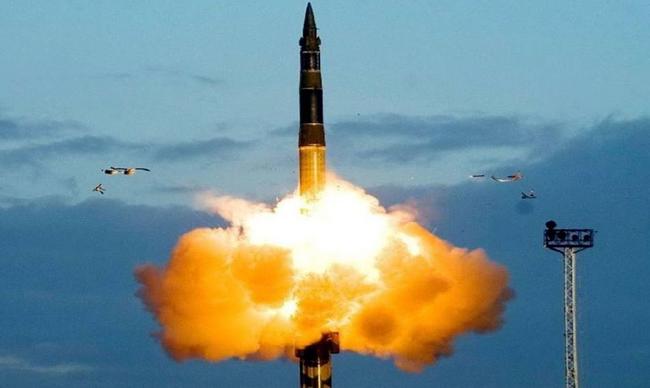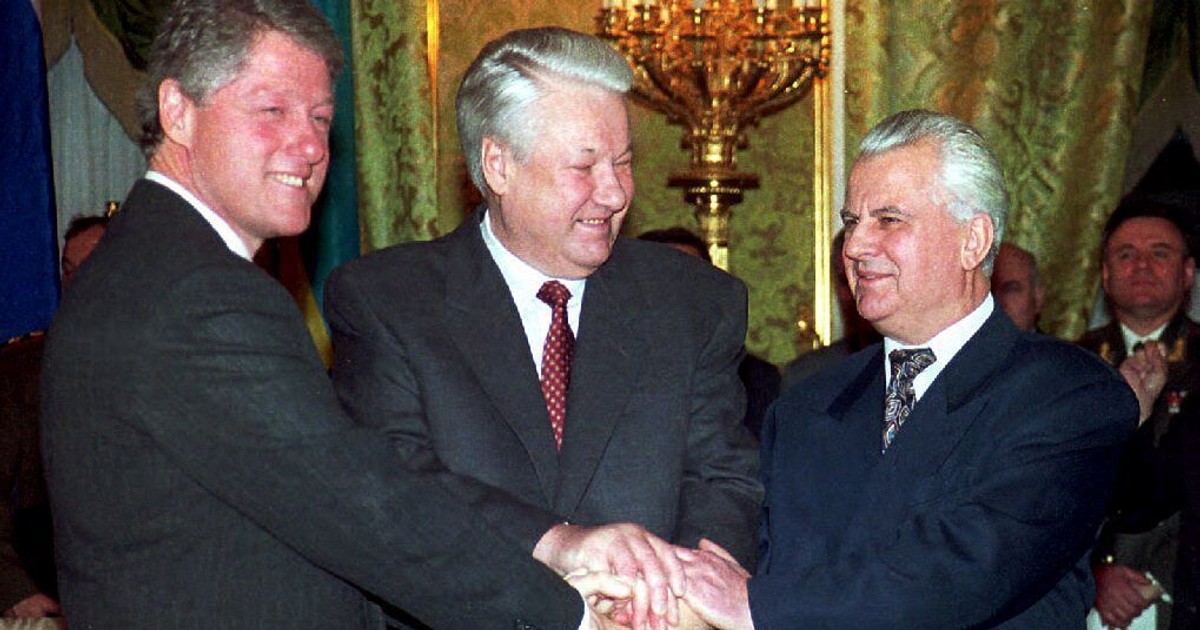
WWIII Will Be Nuclear — Moscow
The warning comes after Moscow placed
units equipped with ICBMs on high combat alert
RT News & Jack Kelly / The German Marshall Fund of the United States
(March 3, 2022) — The next major conflict between world powers will involve atomic armaments and will be catastrophic for the human race, Russia’s top diplomat has warned, amid an escalating standoff with the West over Moscow’s military attack on Ukraine.
Russian state news agency TASS reported on Wednesday that Sergey Lavrov had said in an interview with Al-Jazeera that “World War III would be a devastating nuclear war.”
He also claimed that if Ukraine gained access to atomic armaments, Russia would face “real danger.”
Lavrov’s remarks come after he explained at the Geneva disarmament conference on Tuesday that there will be no victor if a nuclear war were to erupt. Moscow’s top diplomat, who spoke via video link, also called on the US to remove its warheads from Europe. He also accused Kiev of threatening to violate its non-nuclear status.
“It is unacceptable to us that, contrary to the fundamental provisions of the Treaty on the Non-Proliferation of Nuclear Weapons, US atomic armaments are still located on the territory of some European countries,” the veteran official remarked.
He went on to claim that “the dangers posed by [Ukrainian President Volodymyr] Zelensky’s regime to neighboring countries and international security have increased significantly after Kiev’s authorities played dangerous games related to plans to acquire their own nuclear weapons.”
Russia’s President Vladimir Putin ordered placing the country’s ground units, equipped with intercontinental ballistic missiles, as well as vessels from the Northern and Pacific Fleets, on high combat alert on Sunday. He insisted that the move comes after the “illegitimate sanctions” against Moscow and “aggressive statements” made by US and EU officials.
Moscow’s armed forces launched the incursion into Ukraine last Thursday following the president’s address to the nation. The goal of the offensive, according to Putin, is to cripple Kiev’s military and remove so-called “Nazi elements” from the Eastern European nation.

Despite the Threat It Faces, Ukraine Was
Right to Give Up Its Nuclear Weapons
Jack Kelly / The German Marshall Fund of the United States
(February 22, 2022) — Since Russia annexed Crimea in 2014, and even more so with its current military threat to the country, there has been much handwringing over Ukraine’s decision to give up its nuclear weapons in 1994. Many have been asking whether Ukraine would find itself in its current predicament if it had not done so.
Nuclear weapons are often viewed as the trump card in international relations; a threat an enemy knows always looms over them. But, without the proper infrastructure, they are as dangerous to their owner as they are to the enemy, and they create a target for those who wish to acquire these weapons.
Given the regional instability surrounding the newly independent post-Soviet states in 1991 — as well as Ukraine’s budgetary restrictions, lack of a structured military, and need to build global relationships — giving up its nuclear weapons in 1994 was the best decision to ensure that the country grew safely and created strategic partnerships.

The Soviet Nuclear Weapons Inheritance
On December 25, 1991, Mikhail Gorbachev delivered the ten-minute speech that would be his final address as president of the Soviet Union—and the last moments of the state itself. He announced the dissolution of the Soviet Union and moments later the red flag with the hammer and sickle was lowered over the Kremlin as the tricolor flag of the Russian Federation replaced it.
The peaceful transition from one state to another seemingly took place over a matter of minutes that December evening but in fact many events had led to this moment. In the last of these — following Estonia, Latvia, and Lithuania securing their independence in September — the leaders of Belarus, Russia, and Ukraine met at a hunting cabin in the Belarusian forest on December 8 and agreed to dissolve the Soviet Union.
The 12 remaining Soviet republics overnight became independent countries. Due to this abrupt change, many plans and infrastructures of the Soviet Union were still in place as it had not planned to suddenly disappear. Most worryingly, its nuclear stockpile now belonged not only to Russia but also to Belarus, Kazakhstan, and Ukraine where they were spread. Belarus was left with over 100 nuclear weapons, Kazakhstan over 1,400, and Ukraine nearly 9,000 as well as 176 intercontinental ballistic missiles and 44 strategic bombers.
The international community focused immediately on ensuring that the three countries joined the START I treaty to reduce nuclear weapons as well as the Non-Proliferation Treaty. The first two agreed to transfer their nuclear arsenals to Russia, seeing an opportunity to be welcome into the international community as well as to offload the expensive maintenance costs of nuclear weapons.
In Ukraine, some called immediately for sending the weapons to Russia; others called for keeping them as insurance against future aggression from other countries. Either way, the country found itself in command of thousands of nuclear weapons — but without operational control over them. The ability to detonate and use the weapons was still with Russia. By the fall of the Soviet Union, technological advancements in the form of Permissive Action Links had safeguarded most nuclear weapons and centralized who could activate them—only Moscow could trigger the use of the weapons.
Ukraine considered arguing for gaining operational control of some of its stockpile but ultimately it returned or destroyed its inherited nuclear arsenal. It settled for assurances on border security and signed the Budapest Memorandum along with Russia, the United Kingdom, and the United States in 1994.
While in the current crisis this document has been discussed as one that should have provided a framework to protect Ukraine from Russian threats, the truth is muddier. The Budapest Memorandum calls for “respect[ing] the independence and sovereignty and the existing borders of Ukraine” and “refrain[ing] from the threat or use of force” against its borders. However, the United States was not prepared to offer a guarantee of security to Ukraine that “implied a commitment of American military force” in case of attack, as all NATO members enjoy with membership. This was strictly off the table for Ukraine.”
Instead, assurances were given to Ukraine, with no mechanism for its protection or ensuring respect for its borders. The difference between an assurance and a guarantee to Ukraine was made clear by Russia’s annexation of Crimea in 2014.

Ukraine’s Correct Choice
Since the signing of the Non-Proliferation Treaty in 1968, the international community has acted to reduce the number of nuclear weapons. When the Soviet Union fell, it and the United States and were working to reduce their arsenals. The trend had been growing for decades because, in the words of the late Mexican diplomat Miguel Marín-Bosch, nuclear weapons “do not enhance a country’s security but, rather, imperil the survival of all nations.” And the chances of nuclear-weapons-use increase as the number of nuclear-capable countries rises.
In the words of the political scientist Kenneth Waltz, “[m]ore is therefore worse.” This equation drives the global push for the control and nonproliferation of nuclear weapons to this day, from North Korea to Iran, as it did in 1994.
There is a saying in the intelligence world that decision-makers can only make decisions with the information available to them at that moment. They cannot see the future but still have to safeguard their countries’ future and think about possible outcomes.
When it comes to the Budapest Memorandum, working within the confines of the historical moment following the collapse of the Soviet Union and the politically complex situation, there is no doubt the leaders of Russia, Ukraine, the United Kingdom, and the United States made the correct choice not to keep Ukraine as a nuclear-capable country in 1994.
It is not simply a matter of Ukraine not being safe today because it did not keep its nuclear weapons. At the time it took the decision, not only did it not have operational control of its nuclear arsenal, it also lacked any experience in controlling it and the budget to operate even the TU-160 bomber jets it inherited.
Ukraine had inherited not a traditional army, but an enormously powerful military without, as James Sherr writes, “a Ministry of Defence, without a General Staff and without central organs of command-and-control.” Without a capable military imbued with the knowledge of its own nuclear program, its stockpile would have constituted not a deterrent or safeguard for newly independent Ukraine but a large danger to itself and the world.
Thus, newly independent Ukraine could have become a target for bad actors or other states intent on obtaining nuclear materiel or weapons. It is even not inconceivable that Russia would have at some point attempted to retake the Soviet arsenal that had been left in the country.

Budapest Memorandum Support in Action
Russia violated the Budapest Memorandum by annexing Crimea in 2014, claiming that it was protecting ethnic Russians there. A similar situation is playing out currently in Donbas as Russia recognizes the breakaway Donetsk and Luhansk “People’s Republics” as independent.
But, although the Budapest Memorandum did not include a mechanism for enforcing the security of Ukraine’s borders, and Russia has disregarded it and may soon do so again, the United States and the United Kingdom have stood by the commitments they signed in 1994.
The United States has spent billions of dollars training the country’s armed forces and provided it with over 90 tons of military aid. The United Kingdom has sent hardware and advisors to support Ukraine. Meanwhile, the European Union has sent varying levels of support to the country, demonstrating the commitment to help it stay independent.
This Budapest Memorandum support is not trivial. While Ukraine may not enjoy a guarantee of military commitment like a NATO member, the support given to the country has bolstered its military as a modern warfighting force that has been trained by many other premier global militaries. What Ukraine traded away in 1994, it has regained in the form of international recognition and military support.
Ukraine’s position is a tough one; stuck between NATO and Russia, its decisions must be carried out with utmost care. All leaders know that future implications of their decisions are a burden they must carry.
Nuclear weapons would not have made a newly independent Ukraine safer — in 1994, world leaders knew this and acted with an eye toward the future with the Budapest Memorandum. And, while many factors have led to the current crisis between Russia and Ukraine, fortunately the actions of decision-makers in the past have at least safeguarded this crisis from being a confrontation between nuclear-capable countries.
Posted in accordance with Title 17, Section 107, US Code, for noncommercial, educational purposes.